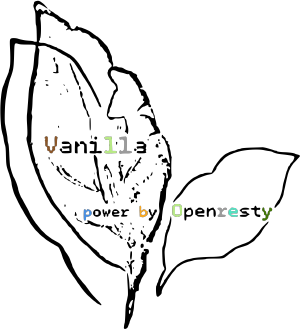Vanilla is An OpenResty Lua MVC Web Framework.
- vanilla-en vanilla-en@googlegroups.com
- vanilla-devel vanilla-devel@googlegroups.com
- vanilla中文邮件列表 vanilla@googlegroups.com
There are two ways to install:
- Make (recommended way)
- Luarocks
Vanilla support many configuration options, many of those option have default value.
You can use default installation but if your enviroment values different from which vanilla default, please config it with yours.
Especially the --openresty-path option. you should make sure it's point to your turely OpenResty install path.
You can run command ./configure --help to learn how to use those options.
Below is the installation of a simple example:
./configure --prefix=/usr/local/vanilla --openresty-path=/usr/local/openresty
make install
You can use luarocks to install vanilla, but three point should be clear:
- Your luarocks should install with lua5.1.x because of the compatibility problems in ABIs between Lua and Luajit.
- parameter NGX_PATH will be disabled in the nginx.conf.
- make sure that command nginx is in your environment PATH.
Vanilla provide two commands vanilla, and vanilla-console.
vanillais for application building, service start, stop and so on.vanilla-consoleis an interactive command line, you can use it for debugging, testing, Lua learning...
Run vanilla in command line, you can find command vanilla provide three options.
vanilla
Vanilla v0.1.0-rc3, A MVC web framework for Lua powered by OpenResty.
Usage: vanilla COMMAND [ARGS] [OPTIONS]
The available vanilla commands are:
new [name] Create a new Vanilla application
start Starts the Vanilla server
stop Stops the Vanilla server
restart First Stops and then Starts the Vanilla servers
reload Reload nginx.conf of Vanilla server
Options:
--trace Shows additional logs
vanilla new app_name
cd app_name
vanilla start [--trace] -- default running in development environment.
-- under bash on linux
VA_ENV=production vanilla start [--trace] -- add VA_ENV to set the running environment.
-- under tcsh on BSD
setenv VA_ENV production ; vanilla start [--trace] -- add VA_ENV to set the running environment.
/Users/zj-git/app_name/ tree ./
./
├── application
│ ├── bootstrap.lua --application boot
│ ├── controllers
│ │ ├── error.lua --application error handling, dealing with corresponding business under this path error
│ │ └── index.lua --vanilla hello world
│ ├── library --local libs
│ ├── models
│ │ ├── dao --data handles for DB, APIs
│ │ │ └── table.lua
│ │ └── service --encapsulations of DAOs
│ │ └── user.lua
│ ├── nginx --openresy http phases
│ │ └── init.lua --init_by_lua demo
│ ├── plugins
│ └── views --one to one correspondence to controllers
│ ├── error --error handle view layout
│ │ └── error.html
│ └── index --index controller views
│ └── index.html
├── config
│ ├── application.lua --app basic configuration such as router,initialization settings...
│ ├── errors.lua --app error conf
│ ├── nginx.conf --nginx.conf skeleton
│ ├── nginx.lua --nginx settings like lua_code_cache.
│ ├── waf-regs --WAF rules
│ │ ├── args
│ │ ├── cookie
│ │ ├── post
│ │ ├── url
│ │ ├── user-agent
│ │ └── whiteurl
│ └── waf.lua --app WAF config
├── logs
│ └── hack --attack logs, keep path can be write
├── pub --app content_by_lua_file path
└── index.lua --entrance file
local IndexController = {}
function IndexController:index()
local view = self:getView()
local p = {}
p['vanilla'] = 'Welcome To Vanilla...'
p['zhoujing'] = 'Power by Openresty'
view:assign(p)
return view:display()
end
return IndexController
<!DOCTYPE html>
<html>
<body>
<img src="http://m1.sinaimg.cn/maxwidth.300/m1.sinaimg.cn/120d7329960e19cf073f264751e8d959_2043_2241.png">
<h1><a href = 'https://github.com/idevz/vanilla'>{{vanilla}}</a></h1><h5>{{zhoujing}}</h5>
</body>
</html>
To answer this question, we just need to see what Openresty has done and Vanilla has done.
- Provides processing HTTP requests a full set of the overall solution
- Opened up a new way for Nginx module development, we can use Lua to deal with Web requests
- Formed an increasingly perfect ecology, the ecological covers all aspects of high-performance Web services
- Implement a Web development routine debugging, error handling, exception handling
- Implement complete processing of the request and plug-in mechanism, support routing protocol, the template engine configuration
- Integration, encapsulates a series of Web development commonly used tool set, class library (cookies, application firewall, etc.)
- Features easy to use and extend
- Support different environment (development, test, online)
- Focus on the business development, not any about nginx nor OpenResty
- Based on OpenResty, have all the good qualities of OpenResty
- Automated, Nginx instruction set of configuration management
- More reasonable use Openresty encapsulation of request processing Phase
- Openresty/Vanilla Dev:205773855 (Vanilla panel discussion related topics)
- Openresty:34782325(Discuss OpenResty and all kinds of advanced technology)
- WeChat public no. of Vanilla Dev:Vanilla-OpenResty(Vanilla related information, document push)

